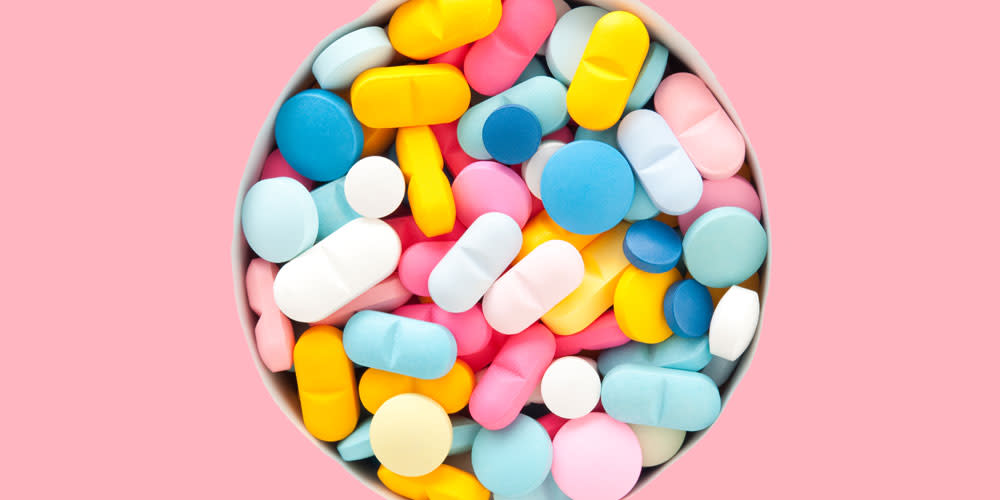Do collagen supplements and drinks actually work?

Collagen is the supplement buzzword of the moment, with a whole host of easy shot-style drinks, powders and pills on the market that claim to rejuvenate your skin from the inside-out. But what exactly are collagen supplements, and do they actually work?
Wimpole Street dietitian Emer Delaney says that collagen is a type of protein found in the skin's connective tissue that plays an important role in the healing process of skin.
"As collagen is a protein, its building blocks are amino acids. Amino acids are produced when the protein we eat, such as meat, fish and dairy products, are broken down. These amino acids are then rebuilt into other proteins such as wound healing, muscle repair or collagen. However, collagen production decreases with age, which causes weaker connections. This is why skin become more wrinkly and joints become less stable."
When you take into account the fact that 75% of our skin is made up of collagen and, from the early age of 20, we lose around 1.5% of this a year, you can appreciate that it's a pretty big deal.

Nikki Cooper, the founder of Inner Me, which produces supplements including marine collagen based Pro Beauty capsules, available at Amazon.co.uk (RRP £14.99), says that it is this desire to stay young that is keeping the nutricosmetics industry (set to be worth approximately £4.8 billion by 2020) booming.
"I can see that there will soon be a time when we will see an 'inside out' skincare regime being as popular as a topical skin care regime. We are a generation becoming obsessed with retaining youthful toned skin and will do anything to achieve this and if diet and supplementation works, then success will follow."
At face value, the idea of making skin healthier from within makes sense. We've all heard the time-old tale that a balanced diet and plenty of water is key to healthy glow. But do these products actually have a visible effect on your complexion? Elena, along with many others, is skeptical.
"There is no robust supporting evidence. In theory [collagen supplements] would reduce wrinkles, but there is no concrete proof for this so you can't really make that claim."
A 2014 study showed that only 15% of subjects taking the Pure Gold Collagen, available at Amazon.co.uk (RRP £26.95), supplement over 60 days had fewer facial lines and wrinkles, and researchers conceded that this could have been down to external factors rather than being the effect of a collagen boost.
Indeed, Nikki admits that the question of collagen visibly improving skin remains murky.
"As to whether there is conclusive proof that ingesting collagen actually leads to increased collagen in the skin, there was a little debate in which the British Skin Foundation did assert that eating collagen did not benefit the skin. However, according to the October 2008 issue of Archives of Dermatological Research, it was said that consuming collagen may increase the body's overall production of collagen, thus promoting skin health. It is quite a subjective matter as we all have different skin make-ups and different diets, which of course has an effect on what results we will see. The general rule of any supplements however is that you need to take them for 2 months before you can feel or see any significant benefit."
It may be that these supplements work for you, but if you're not willing to waste time and money, there are some easy diet and lifestyle changes you can make instead.

The alternatives
In the face of these supplements not having the desired effect, skincare expert Cherry Woods says our best option is to coax our skin into producing collagen naturally. This, as with so many things, starts with your diet.
"Reduce sugar intake diet to limit the glycation process and step up your Vitamin C intake, which will assist in stimulating collagen production. Our skin is constantly fighting free radical damage during exposure to high levels of stress, pollution and processed food, and this damage causes harm to collagen. In order to fight this damage and protect your collagen, eat foods that are rich in Co-enzyme Q (such as mackerel fish) Vitamin E (such as almonds) and plenty of Vitamin C (such as citrus fruits)."
While we can't avoid getting older, accelerated collagen degradation is also hugely influenced by environmental factors. Aside from your diet, Cherry also suggested a number of lifestyle changes you can make to preserve your natural collagen source.
Smoking
Smoking is never a good idea, and it's no secret that it's particularly bad for your skin. This is because many of the chemicals present in tobacco smoke damage both collagen and elastin in the skin, whilst nicotine narrows the blood vessels in the outer layers of the skin. This results in deeper wrinkles and a dehydrated complexion.
Sunlight
Ultraviolet rays in sunlight cause collagen to break down at an increased rate, damaging collagen fibers and inducing the accumulation of abnormal elastin. This in turn leads to the production of an enzyme that can also break down collagen, so all in all it's a good idea to stay sun safe if you're wanting to save your skin. Remember, even your computer is emitting low level UV rays, so try and make sure that your daily cosmetics include SPF.
Autoimmune disorders
Autoimmune system disorders cause abnormally low activity or high activity of the immune system. Some autoimmune disorders cause antibodies to target and weaken collagen, meaning you'll be losing even less of the stuff than you were before! Ok, we know this isn't really a 'lifestyle change' you can make, but it's quite a fun fact.
[editoriallinks id='ef1ee5fa-436b-41f2-915e-4afc359f0c5a'][/editoriallinks]
You Might Also Like


